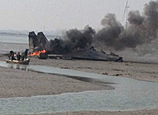
Last month, Afghan forces arrested a senior Pakistani Taliban leader Maulvi Faqir Mohammad in eastern Nangarhar province.
Faqir, the former Taliban chief in Bajaur tribal region, was among the Pakistani Taliban leaders who have regrouped their fighters in Afghanistan's Kunar and Nooristan provinces, Pakistani officials said.
Pakistan's security agencies said in a report to the Supreme Court on March 26 that the Afghan government was colluding with the Pakistani Taliban and that the alleged collusion could lead to a surge in cross-border attacks.
It was the first time that Pakistani security forces openly blamed the Afghan government for colluding with the Pakistani Taliban.
Tensions are rising at a time when Afghanistan needs support in its frustrated efforts to hold peace talks with the Taliban.
Kabul's new approach to pursue the peace process without Pakistan is unlikely to succeed as the Taliban has ruled out any peace talks with Karzai government as long as foreign troops remain in the war-torn country.
Taliban spokesperson Zabihullah Mujahid also ruled out any talks with Karzai during his visit to Qatar where the Taliban is in the process of opening a political office.
It was Pakistan which facilitated Taliban leaders in proceeding to Qatar. Islamabad still has dozens of Taliban prisoners including Mullah Abdul Ghani Baradar, the former deputy to supreme Taliban leader Mullah Omar.
Afghanistan's verbal attack on Pakistan can complicate the peace process which is urgently needed before NATO troops withdraw from the country in order to avoid another civil war.
Islamabad too will have to show how serious it is about the process as open hostilities will have negative effects on Pakistan. The country has already lost 49,000 people in the U.S.-led war on terror and the public is fed up with the massive bloodshed.

















 Experience death, reflect life: Girl stages her own fake funeral
Experience death, reflect life: Girl stages her own fake funeral


![]()
